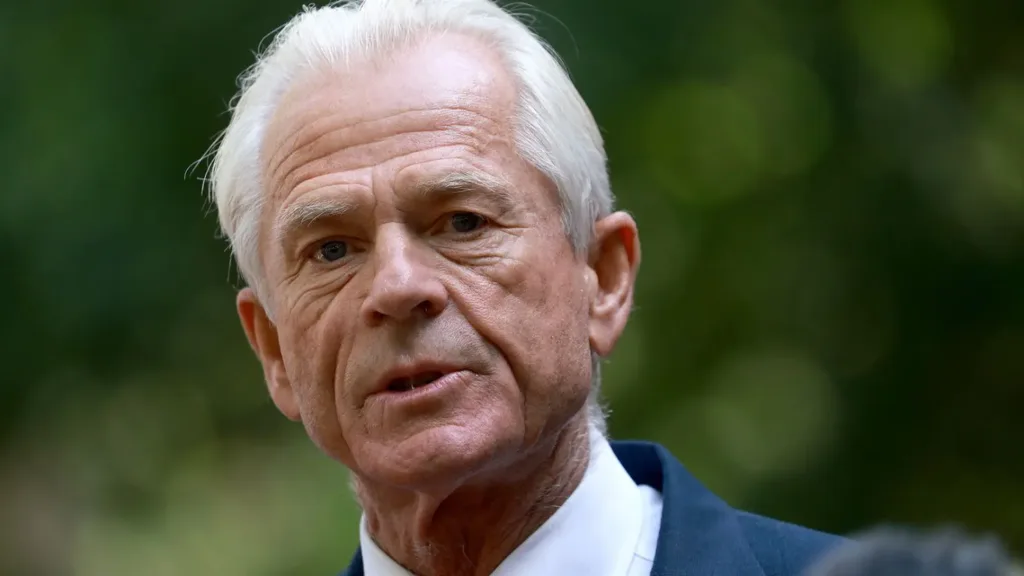Trump’s Trade Adviser Navarro Responds to Elon Musk’s “Moron” Comments Amid Tariff Tensions
White House Official Dismisses Tesla CEO’s Insults Over Foreign Parts Controversy
In the latest episode of high-profile clashes within President Donald Trump’s orbit, top trade adviser Peter Navarro has responded with surprising composure to being labeled a “moron” by Tesla CEO and Department of Government Efficiency (DOGE) head Elon Musk.
The Escalating Trade Policy Dispute
The conflict stems from Navarro’s recent statements regarding Tesla’s manufacturing practices amid the Trump administration’s aggressive implementation of new global tariffs. During an interview discussing America’s latest automobile tariff policies, Navarro characterized Musk as merely a “car assembler” rather than a manufacturer, claiming Tesla vehicles incorporate significant foreign-made components.
This characterization struck a nerve with Musk, who has positioned himself as a champion of American manufacturing and innovation through his various companies. The Tesla CEO known for his unfiltered communication style and frequent use of social media to address critics, didn’t hold back in his response.
Musk’s Scathing Rebuke
In a series of pointed social media posts on Monday, Musk unleashed his frustration, declaring that Navarro “truly is a moron” and is “dumber than a sack of bricks.” These comments followed earlier criticisms where Musk stated that Navarro “ain’t built shit,” seemingly questioning the trade adviser’s practical experience in manufacturing.
The public spat has drawn significant attention given both men’s prominent roles in shaping economic and industrial policy under the Trump administration. Musk serves as a key figure in the Department of Government Efficiency, while Navarro has been instrumental in designing and implementing the controversial 10% global tariff policy.
Navarro’s Unexpected Response
“I’ve Been Called Worse”
In a surprising display of equanimity, Navarro dismissed the tension during an NBC interview on Sunday. “I’ve been called worse. Everything’s fine with Elon,” Navarro stated, seemingly unfazed by the public criticism from his government colleague.
When pressed further about the relationship between the two Trump advisers, Navarro maintained, “Elon and I are great. It’s not an issue.” This measured response suggests either strategic de-escalation or genuine indifference to Musk’s provocative comments.
In a separate interview with CNN’s Kasie Hunt on “The Arena,” Navarro reiterated his position: “It’s no problem,” he told CNN, adding: “It’s like – it’s no problem.”
Personal Background Context
During the NBC interview, Navarro also referenced his recent personal challenges, noting his four-month prison sentence beginning in March 2024 for refusing to comply with a congressional subpoena related to the January 6, 2021, Capitol attack investigation.
“Nobody should have to come into this government and have that happen or have to go to jail like I did,” Navarro remarked, perhaps contextualizing why Musk’s comments might seem trivial in comparison to his recent experiences with the legal system and congressional investigations.
Implications for Administration Policy
Tariff Implementation Tensions
The public disagreement highlights potential fractures within the Trump administration regarding the implementation and effects of the recent 10% tariffs imposed globally. As a leading figure in American manufacturing and innovation, Musk’s criticism of Navarro could signal deeper policy conflicts about how these tariffs impact domestic producers who rely on global supply chains.
Navarro has been a consistent advocate for protectionist trade policies, arguing they strengthen American manufacturing and reduce dependency on foreign suppliers. However, complex manufacturing operations like Tesla’s automotive production often involve globally integrated supply chains that can be disrupted by broad tariff policies.
DOGE’s Efficiency Mission
This conflict also raises questions about the coherence of the administration’s economic strategy, particularly as Musk heads the Department of Government Efficiency, which ostensibly aims to streamline government operations and eliminate inefficiencies. Whether this public disagreement will affect DOGE’s mission or the broader economic agenda remains to be seen.
What This Means for American Manufacturing
The dispute between Navarro and Musk represents more than personal animosity—it highlights fundamental questions about what constitutes “American manufacturing” in a globally interconnected economy. While Navarro emphasizes domestic production of components, companies like Tesla operate within complex international supply networks that can be challenging to fully domesticate.
For American manufacturers and consumers, the outcome of this policy tension could influence:
- Future manufacturing investment decisions
- Consumer prices for vehicles and other products
- Supply chain resilience strategies
- The competitive position of American companies globally
Navigating America’s Manufacturing Future
As the administration continues implementing its trade policies, business leaders and manufacturers must carefully evaluate how these changes affect their operations. For those involved in manufacturing or international trade:
- Stay informed about evolving tariff policies and their implementation timelines
- Analyze supply chain vulnerabilities and explore domestic alternatives where feasible
- Consider engaging with industry associations advocating for your sector’s needs
- Explore resources from the International Trade Administration on navigating changing trade landscapes



